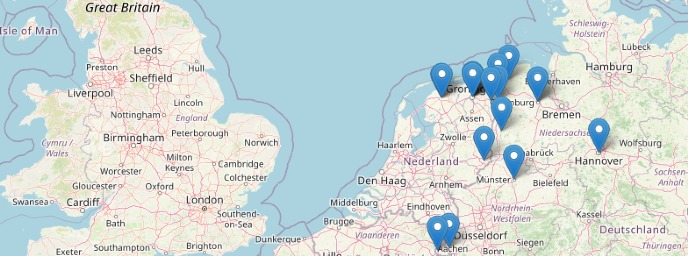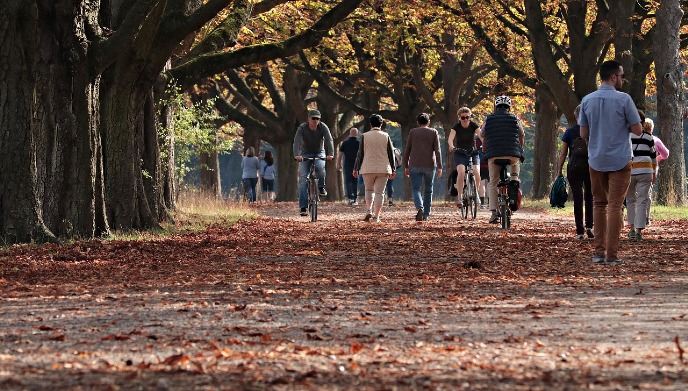Recently funded projects
The Centre for Public Health in Economics and Business (CPHEB) draws its research funding from various sources, for a variety of initiatives that reflect our current themes. CPHEB researchers are part of several (inter)national research consortia. Below you can find information on recently funded projects in which CPHEB is involved.

Health4DE-NL
The main goal of this project is to foster sustained and structured cross-border health cooperation in our region. While several cross-border health projects have been previously implemented, they have been developed at different time points with different goals, without been aligned to a common goal. This situation leads to obstacles in making visible cross-border health and to produce impact on the citizens’ health status in the Northern DE-NL region. Thus, this project aims at strengthening the border region by encouraging healthy citizens and a healthy workforce that keeps the economy of the region strong. To reach such goal, the Cross-border Institute of Healthcare Systems and Prevention (CBI) will be an entity to connect and coordinate new cross-border health initiatives in the region systematically.
Funding
The HEALTH4DE-NL project is being implemented within the framework of the Interreg VI Germany-Netherlands program and is co-financed with 2.33 million euros by the European Union, the Ministry for Federal and European Affairs of Lower Saxony and the provinces of Groningen and Friesland.
Involved UG researchers
Stefan Pichler, Adriana Pérez Fortis, Jochen Mierau, Ashika Maharaj
The HEALTH4DE-NL project focuses on four main domains:
-
Establish a cross-border health network, in which healthcare professionals, policymakers, hospitals, Gemeentelijke Gezondheidsdiensten (GGD’en), and Gesundheitsämter/NLGA collaborate.
-
Analyse healthcare systems and compare them at the regional level, the results form the basis for formulating policy recommendations that promote equal access to care.
-
Improve cooperation between public health services, by organising regular meetings and workshops and appointing cross-border contact persons to strengthen communication.
-
Engage citizens actively, with a focus on vulnerable groups, through public engagement activities around prevention, self-reliance and community participation, citizens are encouraged to take a more active role in their health.
Project information
Planned project costs:
€ 3,230,272.44
Priority:
Working together to build stronger healthcare in the border area between the Northern Netherlands and Northern Germany
Project duration:
01.04.2025- 31.03.2029
Lead partner:
University of Groningen / Aletta Jacobs School of Public Health, lead partner
Project partners:
-
University Medical Center Groningen (UMCG)
-
Carl von Ossietzky Universität Oldenburg
-
GGD Groningen
-
GGD Fryslan
-
Niedersächsisches Landesgesundheitsamt:
- Gesundheitsamt Landkreis Lee
- Gesundheitsamt Landkreis Emsland
- Gesundheitsamt Stadt Emden
- Gesundheitsamt Landkreis Aurich
- Gesundheitsamt der Stadt Oldenburg
Associated Partners
-
Provincie Groningen
-
Provincie Fryslan
-
Gemeente Oldambt
-
University of Twente
-
Universiteit Maastricht (ITEM)
-
Universitätsklinikum Münster
-
Academische Werkplaats Mosa

ECOTIP
The impact of physical environment on population health
ECOTIP focuses on identifying crucial moments when shortages of green, healthy food and clean air in neighbourhoods affect health. It is particularly the less affluent population groups that often develop lifestyle-related diseases, such as obesity, diabetes, cardiovascular diseases, mental and lung problems. At the same time, these population groups often have an unfavourable physical living environment: a lack of nature, an unhealthy food supply, air pollution and noise pollution in their neighbourhood. All these factors can affect people's healthy lifestyle. ECOTIP aims to reduce these health differences in the Netherlands.
Funding
ECOTIP received a subsidy from the Dutch Research Council (NWO) within the National Science Agenda for a period of 5 years.
Involved UG researchers
Stefan Pichler, Jochen Mierau, Erik Buskens, Laura Viluma, Mariana Soares
Applied research
In addition to investigating tipping points, the ECOTIP research team focuses on possible solutions from the perspective of policy, healthcare and citizens in various parts of the Netherlands. This research is being conducted in Leiden-The Hague, Groningen, Rotterdam and Utrecht. In these cities, we are looking for neighbourhoods which can benefit the most of interventions to improve the living environment. This concerns, neighbourhoods with a unhealthy physical living environments, where many people with multiple lifestyle-related conditions live. In these neighbourhoods, the researchers will work with policymakers, general practitioners and public health specialists and citizens. They will look at which policy can be most effective in promoting a healthy living environment. How general practitioners and social physicians can best be supported in providing care to people with health problems as a result of the physical living environment. And the researchers support and encourage citizens to start with a healthy lifestyle and improve their living environment themselves.
Project information
Planned project costs:
4 million euros
Priority:
identifying tipping points in living environments that affect lifestyle-related diseases
Project duration:
2023-2028
Lead partner:
Leidsch Universitair Medisch Centrum (LUMC)
Project partners:
-
Universiteit Leiden (UL)
-
De Haagse Hogeschool (HHS)
-
Universitair Medisch Centrum Utrecht (UMCU)
-
Erasmus Medisch Centrum (Erasmus MC)
-
Universitair Medisch Centrum Groningen (UMCG)
-
Rijksuniversiteit Groningen (RUG)
-
Gemeente Groningen
-
Gemeente Utrecht
-
Gemeente Rotterdam
-
Geocap
-
GGD Hollands midden
-
Accare
-
Hadoks
-
Mezuro
-
Provincie Zuid-Holland
-
WeCity
-
Dienst Gezondheid & Jeugd
-
De Haagse Hogeschool

Interdisciplinary human-robot teams for a future-proof healthcare system in the Northern Netherlands
This project focuses on the acceptance and integration of healthcare robots within healthcare system in the Northern Netherlands through the formation of effective human-robot teams.
This innovative approach aims to maintain the quality of care while addressing the shortage of healthcare personnel, in line with the goals of the “from analog to digital” and the shift “from care to health” of the Knowledge Agenda of the University of the North. This interdisciplinary project will lead to human-robot teams that are technologically competent and attuned to the human aspects of care. The methodology in this project includes co-creative workshops, pilot projects, educational programs and hybrid research. The project promotes cooperation between different knowledge institutions (RUG/UMCG/HBO/MBO), contributing to the RIS3 goal of strengthening the knowledge economy and the focus on preventive care, in line with the RIS3 vision to promote a healthy, active and inclusive society in the Northern Netherlands.
Funding
This project is funded by the booster fund of the University of the North. With the booster fund, the University of the North wants to reward and stimulate initiatives that contribute to the realization of the (RIS-3) objectives from its own Knowledge Agenda. The project has the duration of two years.
Involved researchers
Jenny van Doorn (UG), Sanja Balalic (Hanze), Lieke Brons (Practoraat Healthcare and Technology) and Gloria Araiza Illan (UG)
Primary Goals
This project aims to future-proof the healthcare system in the Northern Netherlands through the cooperation of knowledge institutions in Groningen and Drenthe, in the field of the implementation of healthcare robots. The primary goals within the project are:
-
Knowledge integration and best practices: To collect, integrate and share insights and best practices on the implementation of healthcare robots. This activity will lead to a coherent strategy that brings together previously separate research and implementation paths.
-
Identification of gaps: Identifying knowledge gaps in current research on healthcare robotics. From this collection, in consultation with relevant healthcare organizations, one primary gap will be selected on which a hybrid research group will then focus to conduct a focused project.
-
Educational Development: The development of specialized educational programs for MBO, HBO, and WO that focus on the integration of robots within the healthcare sector and the promotion of effective collaboration in human-robot teams. These programs will be designed based on the insights and best practices gathered and will focus on both the technical and other skills needed for future healthcare professionals.
Project information
Planned project costs:
€ 74,967.00
Priority:
To future-proof the healthcare system in the Northern Netherlands through the cooperation of knowledge institutions in Groningen and Drenthe, in the field of the implementation of healthcare robots.
Project duration:
2025-2027
Lead partner:
Noorderpoort
Project partners:
-
University of Groningen,
-
Hanze University of Applied Sciences
-
Drenthe College, Noorderpoort,
-
Alfa-college,
-
UMCG

